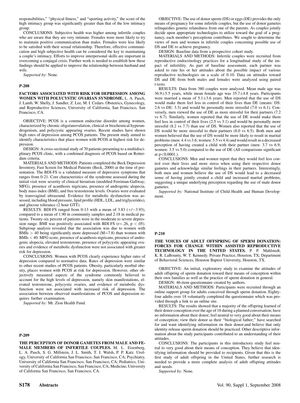Factors Associated With Risk for Depression Among Women With Polycystic Ovarian Syndrome
September 2008
in “
Fertility and Sterility
”

TLDR Women with PCOS and higher BMI, especially those with morbid obesity, are at greater risk for depression.
The study from 2008 aimed to identify characteristics that place women with Polycystic Ovarian Syndrome (PCOS) at the highest risk for depression. It was a cross-sectional study involving 70 patients with a confirmed diagnosis of PCOS. The Beck Depression Inventory, Fast Screen for Medical Patients (BDI-FS) was used to measure depressive symptoms. The study found that the mean BDI-FS score was 3.83, which is higher than community samples (mean of 1.90) and medical patients (mean of 2.18), with 26% of patients in the moderate to severe depression range. A significant finding was that Body Mass Index (BMI) was positively associated with BDI-FS scores, particularly in women with BMIs over 40. However, other PCOS characteristics such as clinical hirsutism, acanthosis nigricans, androgenic alopecia, elevated testosterone, polycystic appearing ovaries, and evidence of metabolic dysfunction were not associated with a greater risk for depression. The study concluded that while women with PCOS experience higher rates of depression, obesity, especially morbid obesity, is a risk factor for depression, but other common PCOS symptoms do not appear to increase the risk of depression. Further research is needed to explore the association between PCOS manifestations and depression. The study was supported by the Mt. Zion Health Fund.



